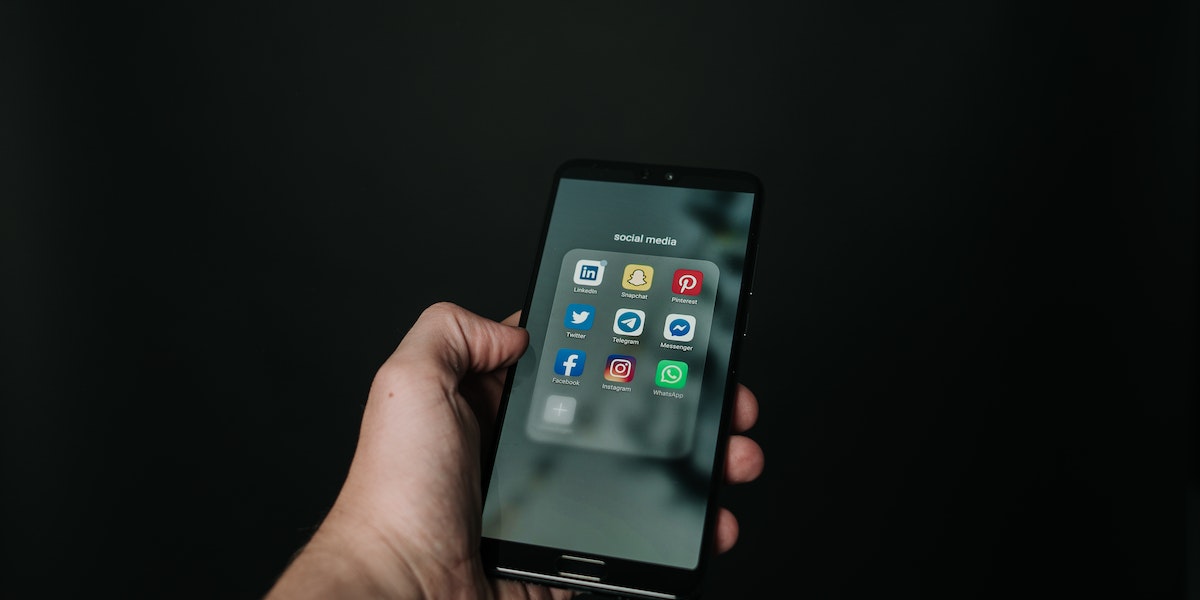
The Future of Social Media and the Rise of Influencers
- By Ilam Padmanabhan
- 04-05-2023
- Social Media
In recent times, social media has become such an integral part of our lives that few could have foreseen its popularity and influence. From Facebook and Twitter to Instagram and TikTok, social media platforms have become the primary way that we connect with each other, consume information, and share our lives with the world.
As the popularity of social media has continued to surge, so too have its influencers. These individuals have gained massive followings on platforms like Instagram and YouTube and have used their influence to sell products, promote causes, and even shape public opinion.
As we delve deeper into this article, let's uncover the hidden potential of social media and influencers. We'll analyze how these platforms have developed over time, reflect on the tremendous influence wielded by influencers, and focus on what lies ahead for social media and those who employ it as an advertising tool.
The Evolution of Social Media
Social media has made remarkable progress since its inception. The early 2000s saw the rise of MySpace and Friendster, which were eventually ousted by Facebook and Twitter in the late 2000's and early 2010's as they emerged as social media giants.
Today, social media is more diverse and fragmented than ever before. While Facebook and Twitter are still popular, newer platforms like Instagram, TikTok, and Snapchat have gained massive followings among younger audiences.
This diversity of platforms has also led to a diversity of ways we use social media. Social media has become a very important tool for many; some use it to stay in contact with their loved ones, while others leverage the platform to build relationships and networks, share content related to their businesses or passions, and be up-to-date on current news.
One of the biggest changes social media has brought about is how we consume information. Social media has become a disruptive force in traditional news outlets, such as newspapers and TV stations, due to more people turning to these platforms for their daily news consumption.
This shift has had both positive and negative effects. On the positive side, social media has made it simpler for people to stay up-to-date and have meaningful interactions with their environment. Conversely, social media has also become a platform for disseminating false information and fake news that can have potentially harmful repercussions.
The Rise of Social Media Influencers
Influencer marketing has established itself as one of the most efficient means for brands to engage with their ideal customers. Influencers are people with a large social media following who can use their platform to promote products and services. The growing distrust of traditional advertising has fueled the rise of influencers, as consumers are more likely to trust the opinions of people they know or admire over traditional advertising. The time people spend on digital media has already surpassed traditional media and there's no looking back.
Among the most considerable advantages of influencer marketing is that it enables brands to access an audience who are well-engaged and specifically catered. Influencers are often considered as experts in their niche and have built up a loyal following that trusts their opinions and recommendations.
In recent years, we've seen micro-influencers rise - those with smaller but highly engaged followings. Micro-influencers may have fewer followers than their famous counterparts but often have a more engaged and loyal following. Brands may find that working with micro-influencers is a more cost-effective way to reach a specific audience. This is becoming a trend, especially within the SaaS products and services which have a smaller but committed audience. For example, a new book summary app company would prefer to sign up a fewer number of micro-influencers who have credibility with their audience rather than work with an internet superstar like Mr Beast.
Influencer marketing is also likely to become more regulated in the future. As the industry grows and evolves, we can expect to see increased scrutiny from governments and other organizations. This may include rules around disclosure and transparency and guidelines around what types of products and services influencers can promote.
The Power of Influencers
Over the last few years, influencers have become a revolutionary force in social media as their presence and influence continue to grow. There are several types of Influencers. Some are celebrities or public figures from various fields who have built a following on social media, while others are everyday people who have gained a large following through their content.
Influencers have become popular due to their genuine and approachable nature when compared to traditional forms of advertising, making them the go-to source for connecting with consumers. Instead of relying on flashy ads and celebrity endorsements, brands can work with influencers who have built trust with their followers and can promote products in a more natural and authentic way. Khaby Lame, for example, endorses some of the big brands that traditionally used celebrities to endorse their brand.
Of course, there are also drawbacks to influencer marketing. Some influencers have been criticized for promoting products they don't actually use or believe in, and there have been instances of fake followers and engagement.
The Future of Influencer Marketing and Monetization
The power of influencer marketing has become undeniably evident with the industry's multi-billion dollar value. Brands and businesses are taking advantage of this tool to progress their reach, connecting with untapped audiences and amplifying their products. As the influencer marketing and monetization industry continues to expand, we can anticipate witnessing unprecedented trends and developments in the digital marketing space.
A trend we can expect to see is the rise of micro-influencers. While big-name influencers with millions of followers may still be highly sought after by brands, many businesses realize the value of working with smaller influencers with highly engaged, niche audiences. Micro-influencers with a few thousand followers can be more affordable for brands while still providing highly targeted reach and engagement.
Another noteworthy trend to anticipate is the utilization of augmented reality (AR) and virtual reality (VR) for influencer marketing.AR and VR technology can allow influencers to create highly immersive and interactive content, giving followers a more engaging and personalized experience. This can also open up new opportunities for monetization, such as virtual try-on experiences for beauty products or virtual tours of hotels and resorts.
Finally, as the influencer marketing industry continues to grow, we can expect to see new regulations and guidelines from social media platforms and governing bodies. This could include rules around disclosure and transparency and requirements for influencer education and training.
Overall, the future of influencer marketing and monetization is bright and full of potential, with new trends and innovations continuing to emerge. As the industry evolves, it will be critical for influencers and brands alike to stay on top of the latest developments and best practices in order to succeed and thrive.
The Future of Social Media
So, what does the future hold for social media? It's difficult to say for sure, but a few trends are worth keeping an eye on.
First, we can expect social media platforms to continue to evolve and adapt to changing user needs. As new technologies emerge, social media platforms will need to find ways to incorporate them into their platforms in order to stay relevant.
We can also expect social media to continue to play an important role in our lives. As more and more people move to social media for their news, information, and entertainment, we can expect social media platforms to become even more integrated into our daily routines.
One potential area of growth for social media is in the realm of virtual and augmented reality. As these technologies become more advanced, social media platforms may find new ways to incorporate them into their platforms, allowing users to interact with each other in even more immersive ways.
Another trend to watch is the growing emphasis on privacy and security. As more and more people become concerned about their personal data and online privacy, social media platforms will need to find ways to address these concerns in order to retain user trust and loyalty.
The Future of Influencer Marketing
As social media continues to evolve, influencer marketing is also likely to undergo some changes. Here are a few trends to watch in the coming years:
Increased regulation
As influencer marketing becomes more prevalent, we can expect to see increased regulation from governments and other organizations. This may include rules around disclosure and transparency and guidelines around what types of products and services influencers can promote.
More authentic content
As consumers become savvier, influencers must find new ways to create authentic, engaging content that resonates with their followers. This may mean moving away from traditional sponsored posts and towards more organic forms of promotion.
Greater emphasis on micro-influencers
As the market becomes more crowded, brands may start to focus more on micro-influencers - those with smaller but highly engaged followings. These influencers may be able to offer a more targeted and authentic way to reach specific audiences while costing less for advertisers.
Greater use of data
As social media platforms become more data-driven, brands may start to use data and analytics to identify the most effective influencers and measure the ROI of influencer campaigns.
The Future of Social Media Advertising
One of the biggest trends in social media advertising is the use of artificial intelligence (AI) and machine learning. AI and machine learning algorithms can help social media platforms analyze user data, including search history, behavior, and preferences, to deliver more targeted and personalized ads. This means that brands can create more effective campaigns and deliver their message to the right audience at the right time.
Social media advertising is also likely to become more integrated with e-commerce in the future. Platforms like Instagram and Facebook already allow businesses to create shoppable posts, where users can purchase products directly from the platform. This trend is likely to continue, with more social media platforms developing e-commerce capabilities to offer a seamless shopping experience for users.
Social Media and the Future of Communication
Social media has fundamentally changed the way we communicate with each other. As the platforms evolve, we can expect to see new ways to connect and interact with others.
One trend to watch is the rise of social media messaging apps. Platforms like WhatsApp and Facebook Messenger already have millions of users, and we can expect to see more social media platforms developing their own messaging apps in the future. Messaging apps offer a more private and intimate way to communicate with friends and family, and can also be used for customer service and other business-related communications.
Another trend is the use of social media for customer service. Social media platforms have become a popular medium for customers to contact brands with questions, complaints, and feedback. As the use of social media for customer service grows, we can expect to see more brands investing in social media monitoring tools and chatbots to provide faster and more efficient customer service.
Social media is also likely to integrate more with other communication technologies, such as voice assistants and smart speakers. We can already see the integration of social media into other business functions through software such as GoHighLevel. As these technologies become more prevalent, we can expect to see more ways to connect and interact with social media through voice commands and other interfaces.
The Future of Social Media and Society
Social media has profoundly impacted society, both positively and negatively. As the platforms evolve, it's important to consider how they may impact our future.
One potential area of concern is the impact of social media on mental health. Studies have shown that social media use can contribute to feelings of anxiety, depression, and loneliness. This is due in part to the constant comparison and pressure to present a curated and idealized version of oneself online.
On top, the constant release of dopamine when using social media excessively can make people's lives outside the platforms seem shallow, often leading to overeating and less physical activity.
In the future, we can expect to see more emphasis on mental health and well-being on social media platforms, with features and tools designed to help users manage their mental health, give them motivation to exercise, and find support.
Another potential impact of social media on society is its role in shaping political discourse and democracy. Social media has been credited with facilitating social movements and empowering marginalized communities. However, it has also been criticized for spreading misinformation, polarizing political opinions, and contributing to the rise of extremism. As social media plays an important role in political communication, it's important to consider its impact on democracy and civic engagement.
Finally, the future of social media will also be shaped by privacy and data security issues. The increasing amount of personal information shared on social media platforms has raised concerns about data breaches and misuse. In response, we can expect to see more regulations around data privacy and security and increased social media platform efforts to protect user data.
Wrap Up
The future of social media and influencer marketing is an exciting and constantly evolving landscape. As social media platforms continue to adapt and change, we can expect new opportunities and challenges for brands and influencers alike.
The key to success in this space will be the ability to stay nimble and adapt to changing trends and consumer preferences. Whether you're a brand looking to leverage the power of influencers or an influencer looking to build a strong personal brand, staying ahead of the curve and embracing new technologies and strategies will be essential to success.
Recent blog

Crafting Eye-Catching Instagram Reels In Just 9 Easy Steps
Social Media | 25-04-2024.png)
Boost Sales and Conversions with Shopify's New AI-Powered Semantic Search
E-commerce | 24-04-2024




